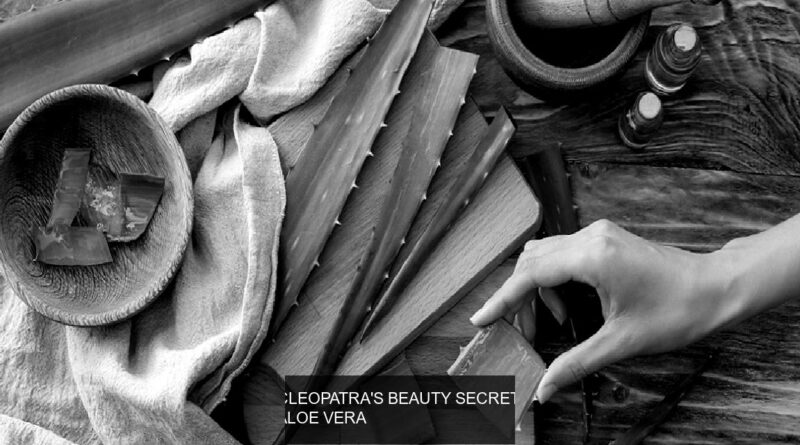CLEOPATRA’S BEAUTY SECRET: ALOE VERA
The aloe vera plant has been used by different cultures for thousands of years for health, pleasure and skin care purposes. Egyptian queens Nefertiti and Cleopatra used this herb in some of their regimens of indulgence. Aloe vera contains vitamins, minerals, amino acids, salicylic acid etc. It contains nearly 77 components.
HOW TO USE ALOE VERA PERCENTAGE?
Today, it is found in various cosmetic products such as night creams, soaps, shampoos, cleansers, and sunscreens. It has a valuable benefit on acne treatment, and when used together with exfoliating acne creams, the treatment is faster and side effects such as redness are less common. Today, gel and cream preparations containing aloe vera in different ratios and compositions, which can be used for wound healing, are available in the market. There are many cosmetic products that contain aloe vera. If redness, burning or flaking develops during the use of these artifacts, you should cut the artifact and consult your dermatologist.
WHAT ARE THE BENEFITS OF ALOE VERA FOR THE SKIN?
- The biggest factor in skin aging and staining is uncontrolled exposure to UV rays. Aloe vera protects the skin against radiation damage thanks to the antioxidant properties of some minerals such as vitamin A (beta carotene), vitamin C, vitamin E and selenium and zinc.
- The mucopolysaccharides it contains help to provide moisture to the skin.
- By increasing the production of collagen and elastin, it makes the skin more elastic and less wrinkled.
- In addition to these cosmetic benefits, it also reduces the risk of skin cancer by repairing the damage caused by the sun’s rays on the skin cells.
- Aloe vera contains 6 antiseptic spies, including salicylic acid; This ensures that it has a therapeutic effect on viruses such as fungi, bacteria and herpes.
- It contains magnesium lactate, which has anti-itch activity. It can be used for itchy skin diseases and insect bites for this reason.
- Various scientific studies with aloe vera have been tried in the treatment of chronic skin diseases such as psoriasis, eczema, and lichen planus, and successful results have been obtained. Therefore, it may be beneficial to reduce the use of cortisone in these diseases where cortisone cream should be used frequently.
- Aloe vera increases fibroblast activity and increases collagen production and cross-links formed by collagen. In addition, the mucopolysaccharides, amino acids, zinc and water it contains facilitate wound closure and reduce scar formation. For this reason, it is used in the treatment of burns and open wounds.
DOES ALOE VERA HAVE DAMAGES TO THE SKIN?
If applied topically to the face, it can cause redness, burning, tingling, and rarely eczema spreading throughout the body. For this reason, before using it, it is useful to try it on a small area of the body, such as the inner face of the arm. Aloe vera is a type of plant from the lily family, and those who are allergic to this cluster of plants should not use it.
Patients who have chronic diseases such as heart disease and diabetes and who use drugs should definitely consult their physicians before using the oral tablet forms of aloe vera. Since the oral tablet forms can theoretically cause uterine contractions, pregnant women; It is not recommended for breastfeeding mothers as it will cause discomfort in the digestive system of the baby. In these two cases, it is beneficial not to apply the sliding forms to large areas in terms of safety. When applied to more than 1/3 of the body, the cream form can also enter the systemic circulation.
Oral forms may predispose to abdominal pain, diarrhea, red urine, hepatitis and colorectal cancer in long-term use. Its diarrheal effect can cause electrolyte imbalance, especially potassium. For this reason, oral forms are not recommended for those with liver and kidney failure. There is no special prohibition on its use in children and the elderly.
WHO SHOULD NOT USE ALOE VERA?
It should be used or not used under supervision before and after surgery in pregnant and lactating mothers, allergy sufferers, advanced age, small children and infants, (with severe burns and surgical open wounds), kidney patients and individuals who will undergo surgery.
RECOMMENDATIONS FOR THOSE TO USE ALOE VERA
If redness, burning or flaking develops during the use of these artifacts, you should cut the artifact and consult your dermatologist.
Since it may contain many risks, the use of ready-made preparations on which allergy tests have been carried out instead of the definition proposal to be prepared in the dwelling prevents important health issues that may arise.
IS ALOE VERA TOXIC TO 0 BLOOD SET? DO YOU HAVE SCIENTIFIC SUPPORT?
There is no scientific study showing that aloe vera has a toxic effect, especially in people with 0 blood clusters.
WRITING: Dermatology Specialist Dr. Selma Salman
Pure care: Rose water

